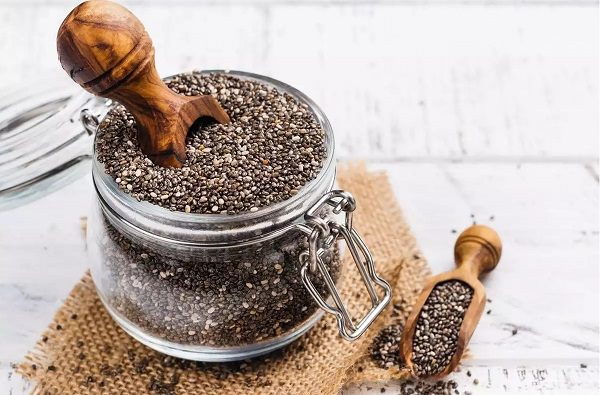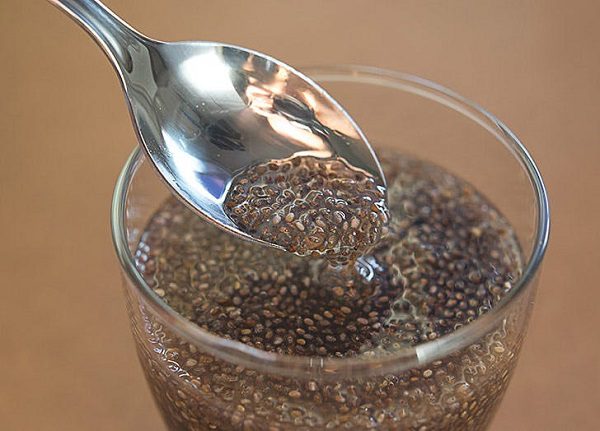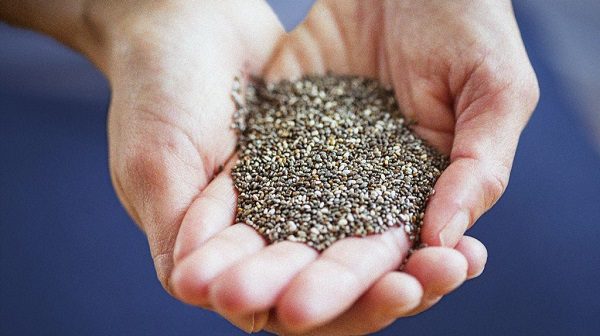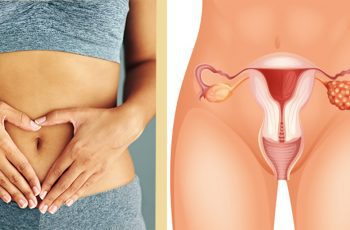
Chia seeds, a superfood dating back to Aztec times, are now enjoying a rebirth of sorts. They feature in every nutritional A-list as a rich source of fiber, omega-3 fats, protein, vitamins, and minerals. Granted, chia seeds are a great source of nutrition as part of a balanced diet and they are also constantly marketed as a weight-loss aid and wolfed down in large quantities by weight watchers, but you can have too much of a good thing, and this superfood is no exception. Learn about the chia seeds side effects has on your health here!
6 Chia Seeds Side Effects
Can Cause Constipation Or Diarrhea – Chia seeds are very high in fiber content. At nearly 11 gm per ounce serving, it takes care of a sizable chunk of the American Dietetic Association’s recommended fiber intake of 38 g for men and 25 g for women for the day. It’s a good idea to eat chia seeds with a lot of water or soak them first. Soaking makes it easier to digest them. It offers the added benefit of releasing all the nutrients stored inside. (Soak 1 tbsp chia seeds in 1 cup water overnight. Or grind them and use them in smoothies.)
Can Make You Choke – Chia seeds have gained notoriety as a choking hazard. As one Time magazine report highlighted, incorrect consumption can lead to complications. When you don’t presoak your chia seeds or eat them without roasting, you run the risk of gagging or choking on them. Unfortunately, there’s a chance you’ll end up in the ER as well. (Always soak the seeds or roast them.)

Can Prevent Blood Clotting – As they are loaded with omega-3 fatty acids, chia seeds can act as natural blood thinners, preventing your blood from clotting.5 If you are already taking blood-thinning medication like warfarin, steer clear of chia. Avoid chia seeds right after surgery to avoid excessive bleeding.
Can Worsen Your Diverticulitis – People with diverticulitis develop bulging sacs or pockets called diverticula along the lining of the large intestine. These get inflamed and try to push out through the colon wall. Causing pain (usually on the left side of the abdomen), bloating, or diarrhea. Chia seeds are high in fiber and can help treat diverticular diseases. Still, you should avoid them when an attack is underway. These tiny seeds often get stuck in the diverticula and inflame them.
Can Set Off An Allergic Reaction – If you have a seed or nut allergy, you may be allergic to chia seeds too. Chia seeds have a lot of protein in them. And that’s bad news if you are allergic to the protein in chia. Reactions can range from skin rashes and hives to watery eyes, vomiting, and diarrhea. Watch out for repetitive coughing, wheezing, difficulty swallowing, and a hoarse throat. You may feel dizzy. As inflammation flares up in the larynx, tongue, and mouth, you could find it difficult to talk and even breathe.

Can Trigger Prostate Tumors – Recent research says chia seeds increase prostate tumor formation. Don’t overindulge. A 2010 study claimed that the omega-3 fatty acid alpha-linolenic acid did not increase prostate cancer risk and that it even marginally decreased the risk. But a recent 2013 study indicates that eating foods high in omega-3 fatty acids – like chia seeds which contain alpha-linolenic acid – could trigger the formation of prostate tumors. This could imply an increased risk of prostate cancer. The jury is still out on this one, but you may want to hold off on binging on chia.
In conclusion, take up to two servings per day to help with:
1. Gastrointestinal Issues
Zellner says that chia seeds are good for your digestive system because they contain a lot of fiber, but overdoing it could cause a stomach ache. It can cause symptoms like bloating, abdominal pain, diarrhea, constipation, or gas if you eat too much fiber or eat it in a concentrated form. According to Zellner, if you have Irritable Bowel Syndrome or Crohn’s disease, you should watch your chia seed intake more closely, especially if you are experiencing a flare-up.
Constipation can be treated and prevented by starting with a half-tablespoon and working your way up to a well-tolerated amount that aids bowel movements, as Guzar advises. “Fibers need to be hydrated so that they can pass through the gut easily,” advises Dr. Axe.
2. Low Blood Pressure/Bleeding
You can lower your risk of cancer and heart disease by eating chia seeds, which are rich in omega 3 fatty acids. If you’re already taking blood-thinning medication or have low blood pressure, an excessive amount of omega-3 fatty acids could cause your blood to thin out, according to Zellner.
3. Effect On Blood Sugar
Food digestion and the absorption of macronutrients, including sugars (also known as glucose), can be delayed by fiber in chia seeds,” Guzar explains. “When combined with other proteins and fats, this can encourage gentler increases and decreases in blood sugars.”
Although this is generally a good thing, Zellner recommends consulting with your doctor before adding these seeds to your next smoothie if you are taking medication to control your blood sugar.
4. Allergies
Those who have an allergy to mint, sesame, or mustard seeds should be wary of consuming chia seeds because they are in the mint family. The symptoms of a food allergy may include nausea and vomiting, diarrhea, itching of the lips or tongue, or anaphylaxis.
5. Potential Effects On Pregnant People
Bustle spoke with Guzar, who says that chia seeds are safe for pregnant women because they can relieve constipation when consumed in moderation. However, if you’re not used to eating high-fiber foods, Zellner cautions that you should keep in mind that your digestive system may undergo some changes during pregnancy, so it’s not the best time to begin experimenting with chia-powered smoothies.
Talk to your doctor if you’re concerned about any of these side effects, and start small. If you’re not sure how your body will react to the chia seeds that you’re about to eat, I’d recommend starting with a scant half tablespoon or less,” she says.
Chia seeds are a powerhouse of goodness and Ayurveda recommends adding them to your regular diet. They are great for providing fiber. With the lack of understanding on how it can affect those with high triglycerides and low blood pressure, more studies will be needed before we understand if this superfood is safe to consume for pregnant women. Just make sure that you don’t rely on just chia seeds for your daily fiber intake. If you are aiming to lose weight, having more of it won’t help you lose much. Typically, 1–1.5 tablespoons taken up to twice a day should be fine for most people and also avoid chia seeds’ side effects. That’s the equivalent of a 20 gm serving that has 139 Cal.
Frequently Asked Questions (FAQs)
What are the negative effects of chia seeds?
Large chia seed consumption can have negative consequences on some people, especially those with allergies, diabetes, and high blood pressure. In addition to causing weight gain, eating too many chia seeds may also cause digestive problems.
How much chia seeds should you eat a day?
0.7 ounces (20 grams, or about 1.5 teaspoons) of chia seeds twice daily is a typical dosage suggestion. To avoid any negative effects on your digestion, don't forget to drink lots of water. Simple to prepare, chia seeds are often used in smoothies and oatmeal as an egg substitute.
Can chia seeds cause kidney stones?
Consuming a lot of protein also lowers the level of citrate, a molecule found in urine. The function of citrate is to stop kidney stones from forming. Quinoa, tofu (bean curd), hummus, chia seeds, and Greek yogurt are examples of plant-based proteins that can replace animal protein.
When is the best time to take chia seeds?
The best time to eat chia seeds is in the morning, especially on an empty stomach, because they boost metabolism and aid in the digestion of all of your meals throughout the day. However, some evidence also suggests that consuming them at night promotes a healthier sleep cycle.




